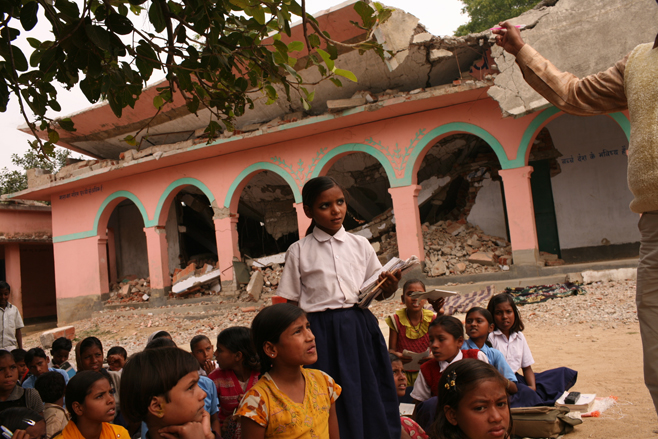Global: Schools No Havens in War Zones
Governments Should Outlaw Attacks on, and Military Use of, Education Sites
Governments should improve protections for students and teachers during wartime by explicitly outlawing attacks on schools and curtailing their use by the military, Human Rights Watch said in a report released today.

Schoolchildren sit in a makeshift classroom in the courtyard of the Birhni Middle School. The school was bombed by Maoist guerillas on December 27, 2009. Maoist guerillas have been responsible for several attacks on public schools and other government buildings in this district, harming access to education to thousands of children. Birhni, Aurangabad district, Bihar State.
© 2010 Moises Saman/Magnum Photos for Human Rights Watch
The 162-page report, "Schools and Armed Conflict: A Global Survey of Domestic Laws and State Practice Protecting Schools from Attack and Military Use," examines domestic laws and military policies in 56 countries around the world. Governments have been slow to update and align their domestic legislation with the explicit prohibitions on attacks on schools under international criminal law, Human Rights Watch said. They are also failing to account for the negative consequences for children's right to education when armed forces convert schools into bases and barracks.
"Children are entitled to go to school in a safe environment, even during times of conflict," said Bede Sheppard, senior children's rights researcher at Human Rights Watch. "Attacks on schools and the military use of schools jeopardize children's safety and education."
Since December 2008, schools have been attacked in at least 16 armed conflicts. Opposition armed groups are primarily responsible for such attacks, because they view schools as symbols of the government or oppose educational practices such as schooling for girls. Under the Rome Statute, which established the International Criminal Court, an intentional attack on any building dedicated to education is a war crime if the building is not a military objective. Yet Human Rights Watch's survey revealed that only 27 out of the 56 surveyed countries had domestic legislation explicitly criminalizing intentional attacks on schools.
"An attack on a school is an attack on a child's future and on a country's development," Sheppard said. "Having a law on the books that says plain and simple that an attack on a school can be a war crime sends an important message that centers of learning should not be targets during war."
In the same time period, government forces or non-state armed groups have used or occupied schools as bases, barracks, or for other military purposes in at least 14 armed conflicts. In some situations, military use of school buildings has displaced all students from the school. In others, forces occupied only parts of school buildings, while students tried to carry on their studies in the remaining space.
The simultaneous use of a school for both military and education purposes places civilians at unnecessary risk and violates international humanitarian law, or the laws of war, Human Rights Watch said. Moreover, a prolonged use of a school for military purposes risks interfering with children's right to education.
Human Rights Watch's global survey highlights eight countries with laws or military policies that either explicitly ban or restrict the use of education buildings by military forces: the Philippines, Colombia, Ireland, India, New Zealand, Ecuador, the United Kingdom, and, in the case of higher education buildings, Greece. The report notes, however, that instances of school use by armed forces nonetheless continue to be of concern in the Philippines, Colombia, and India.
"The Philippines and Colombia have shown that banning the use of schools by their armed forces is not at odds with combating an insurgency," Sheppard said. "Other countries should do the same and end a practice that endangers both students and education."
The schools attacked in the 16 armed conflicts since December 2008 are in Afghanistan, Burma, the Central African Republic (CAR), Colombia, Cote d'Ivoire, the Democratic Republic of Congo (DRC), India, Iraq, Israel and the Occupied Palestinian Territories, Libya, Pakistan, the Philippines, Somalia, Sudan, Thailand, and Yemen.
Schools occupied or used as bases, barracks, or for other military purposes in at least 14 armed conflicts during the same time period by government forces or non-state armed groups are in Afghanistan, the Central African Republic, Colombia, Cote d'Ivoire, the Democratic Republic of Congo, India, Libya, the Occupied Palestinian Territories, the Philippines, Somalia, Sri Lanka, Sudan, Thailand, and Yemen.
Human Rights Watch called on governments to make explicit in their criminal and military law that an intentional attack on school buildings not being used for military purposes during armed conflict is a war crime. All countries should also enact domestic legislation or other policies that either prohibit or regulate armed forces' use of schools to protect the safety of children and teachers, and to ensure children's right to education.
Source: Human Rights Watch
- 564 reads
Human Rights
Conscience, Hope, and Action: Keys to Global Peace and Sustainability

Ringing FOWPAL’s Peace Bell for the World:Nobel Peace Prize Laureates’ Visions and Actions

Protecting the World’s Cultural Diversity for a Sustainable Future

The Peace Bell Resonates at the 27th Eurasian Economic Summit

Puppet Show I International Friendship Day 2020

